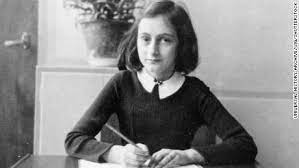The mystery of Anne Frank betrayal laid bare

AFP – One of the great mysteries of the Second World War may have been solved after an investigation identified a Jewish notary as the main suspect of having betrayed the then-teenage Anne Frank -author of her famous diary- and her family.
This investigation was conducted by a former FBI agent into this nearly eight-decade-old unsolved mystery of who betrayed Anne Frank and allowed the Nazis to find her hideout, a book to be released this week has revealed.
Arnold van den Bergh could have revealed Anne Frank’s hiding place in Amsterdam to save his own family, according to an investigation that lasted six years and was reflected in the work The Betrayal of Anne Frank by Canadian author Rosemary Sullivan, which will be presented to the public on Tuesday.
The accusations against Van den Bergh, who died of cancer in 1950, are based on evidence, including an anonymous letter sent to Anne’s father, Otto Frank, after World War II, according to excerpts published by Dutch media on Monday.
The Anne Frank Museum told AFP that the investigation, led by retired FBI agent Vincent Pankoke, is a “fascinating hypothesis” but warned that further investigation is needed.
The 15-year-old teenager, whose ordeal became famous after the publication of her diary written between 1942 and 1944, when she and her family were clandestine in an apartment in Amsterdam, was arrested in 1944 and died the following year in the concentration camp. Bergen-Belsen concentration.
Theories about how the Nazis got to the hideout the Frank family occupied for two years until they were discovered on August 4, 1944, abound, but Van den Bergh’s name hadn’t received much attention.
This new research was carried out using modern techniques, including artificial intelligence to analyze huge amounts of data.
Thus, the list of suspects was reduced to four people, including Van den Bergh, who was a founding member of the Jewish Council, an organization that the Nazis imposed on Jews to organize deportations.
Investigators discovered that Van den Bergh managed to avoid deportation, and the order was revoked close to the betrayal that allowed the Nazis to find the Frank family.
“We don’t have a smoking gun, but we do have a hot gun with empty shell casings around it,” Pankoke told Dutch broadcaster NOS .
Ronald Leopold, director of the Anne Frank House, warned that doubts still persist about the anonymous note and that more in-depth investigation is necessary.
“We have to be very careful about writing someone down in history as the person who betrayed Anne Frank if you are not 100 or 200% sure of it” he said
After the raid, the family was deported and Ana and her sister died in the Bergen-Belsen camp the following year. Her father posthumously published the diary, which has since sold more than 30 million copies.





